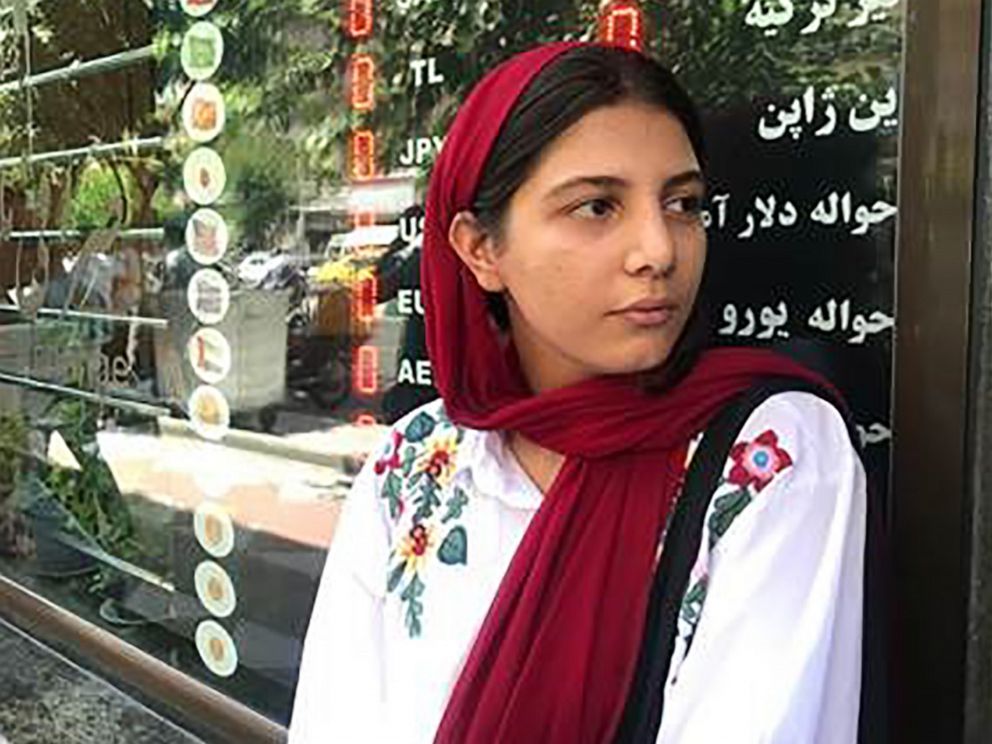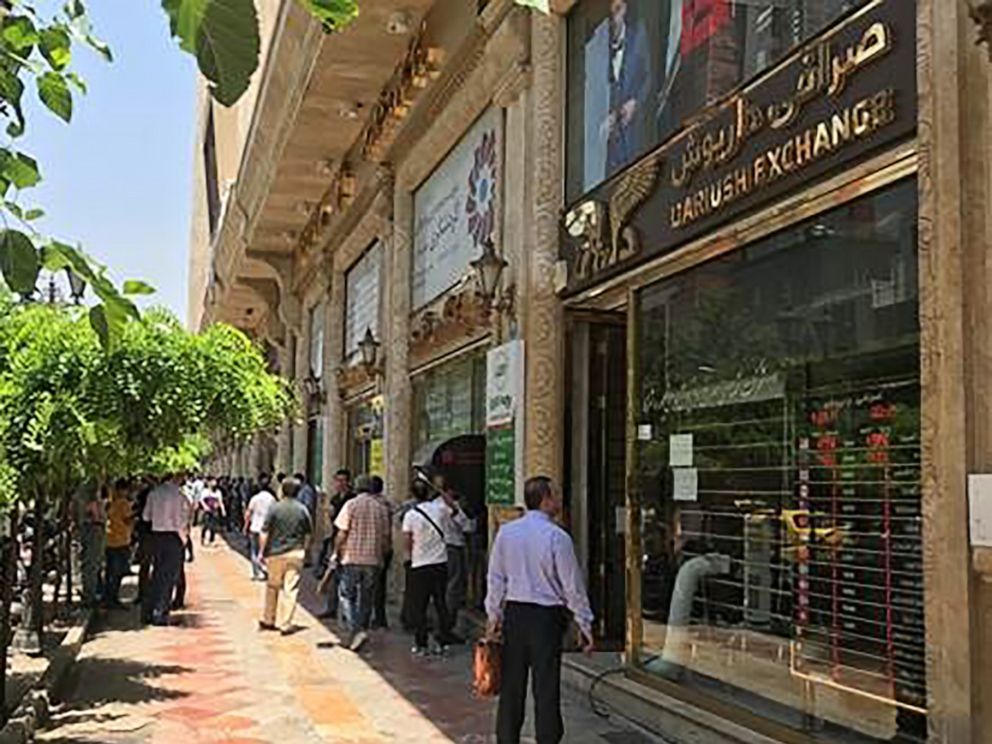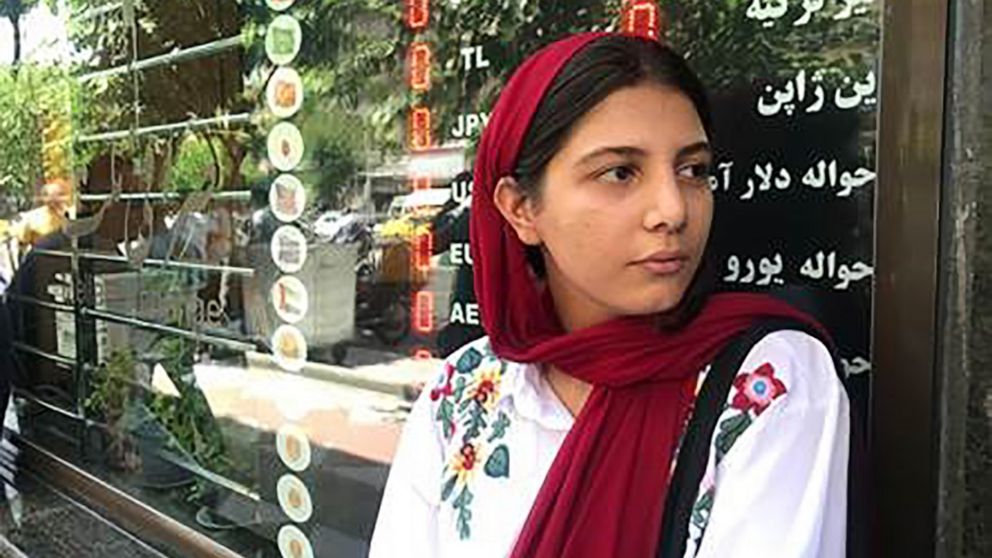Iranians navigate turbulent currency market, uncertain future
TEHRAN, Iran -- Standing in the line at a currency exchange shop on a warm afternoon near Ferdowsi Square in Tehran, Nafas Anvari, 26, waited for her turn to change all her savings into U.S. dollars before the value of the Iranian rial dropped even more.
“It was the first thing I knew I had to do this morning, because every single day my money loses value,” Anvari, an English teacher, told ABC News.
Anvari was in hurry to change her money because she plans to leave the country and pursue a Master’s degree in Florence, Italy. She has no plans to come back after her studies, saying her hopes for an improved situation in Iran have “evaporated” as the U.S. and Iran have failed to improve their relationship.

Tensions between Iran and the U.S. escalated in May 2018, after President Trump announced he would withdraw from the Joint Comprehensive Plan of Action, known as the Iran nuclear deal, and reimpose sanctions on the country.
In June, Japanese Prime Minister Shinzo Abe visited Tehran and met with Iranian Supreme Leader Ayatollah Ali Khamenei, reportedly with a message from President Trump asking Khamenei to enter into new negotiations with the U.S.
The White House has declined to say whether Trump gave Abe the message, but the president publicly thanked Abe for "going to Iran to meet with Ayatollah Ali Khamenei."
“I personally do not consider Trump worthy of exchanging any messages with, and do not have and will not have any response for him,” Khamenei told Abe, according to the Iranian leader’s official website on June 13.
With shattered hopes for a new round of talks that could potentially lead to an international deal for Iran, the country’s currency market plummeted, with the value of the rial falling from 130,000 per dollar on June 12, to 137,000 per dollar on June 13.
“[The] currency market is the first place you see the consequences of political changes,” Siamak Ghassemi, an expert on the Iranian economy and the CEO of Bamdad Economic Research Institute, told ABC News. “When there is hope for solving political problems, rates gets balanced, and any negative news leads to another spike and devaluating rial."
On June 15 , Simin, 56, who declined to give her last name for safety reasons, was going from one currency exchange shop to another in Tehran to find the best rate for buying euros to save some cash for her son’s university expenses. He plans to leave Tehran to study material science and engineering in a European country by the end of summer.
“With no negotiation, I am sure my country won’t be the place my son can seed plans for his future,” said Simin.
Iranian state TV and official media outlets often cite America’s untrustworthiness as the reason for Tehran’s refusal to join a new round of negotiations with Washington.
“International Atomic Energy Agency has approved Iran’s complete adherence to the JCPOA in 15 reports…In the framework of the JCPOA, Iran asks the remaining members of the deal to fulfill their commitments and let Iran enjoy economic benefits of the deal,” Iranian President Hassan Rouhani said at the 19th Shanghai Cooperation Organization Summit in Bishkek, Kyrgyzstan, on June 14.
Iranian officials and state media that once denied that there would be consequences from international sanctions, and went so far as to call them “opportunities” for domestic developments, now publicly complain about the damages sanctions have done to the country.

In late May, Javad Zarif, Iran’s foreign minister, called U.S. sanctions “economic terrorism” against Iranian people in an interview with ABC News.
The strain between Washington and Tehran has increased even more in recent weeks after several attacks on commercial oil tankers in the Gulf of Oman.
U.S. Secretary of State Mike Pompeo directly accused Iran for the attack on June 13, but Iranian officials declined any involvement in the incidents, with officials saying the attacks were “suspicious” and a “complementary” measure to economic sanctions.
“Every day we wake up to some bad news. This time it was the tankers. And like always, each side of the fight accuses the other. We are not just bewilderedly watching, [we] live a bewildered life,” said Nafas Anvari.
While Ghassemi does not believe the U.S. and Iran have intentions to engage in a serious war, he does not foresee any stability in Iran’s currency market in the near future, due to the turbulent political atmosphere between the two countries.
“Unfortunately, the market will remain inflammatory, making it frustratingly difficult for the people to make long-term, mid-term or even short-term decisions,” he said.




